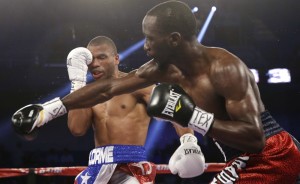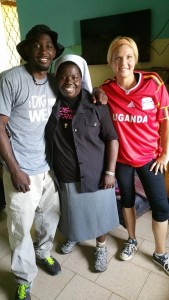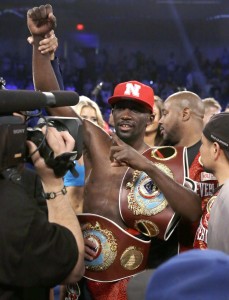
Promoter Bob Arum calls Terence Crawford “the American equivalent of Manny Pacquiao,” and he wasn’t necessarily talking about in the boxing ring.
There is a chance, perhaps a very good chance, that Pacquiao’s next bout will be in early 2016 against Crawford, the 2014 Fighter of the Year.
Crawford would likely win that fight if he gets it, many boxing insiders say, and it would push his stardom into a realm that he may not be all that comfortable with.
Crawford, who fights Dierry Jean on Saturday in Omaha, Neb., on HBO, is the type of guy who can do just fine without a lot of attention or media exposure.
But those who know him well want to shout to the mountaintops about him because of his kindness, his devotion to the less fortunate and his all-around genial nature.
He literally has given someone the clothes off his back.
Pacquiao is a well-known philanthropist who gives thousands, if not millions, of dollars to charity, and Arum sees many similar traits in Crawford.
When Crawford was 18 and a burgeoning star in the USA Boxing amateur program, he went to Venezuela for a Pan American Games qualifying tournament. He brought a suitcase filled with Team USA gear with him to wear while on the trip.
His sister, Leticia, had dropped him off for the trip, but when she picked him up, she noticed he only had the clothes he was wearing and nothing else.
“I said, ‘Where’s all your stuff?’ ” she told Yahoo Sports. “And he said, ‘I gave it away.’ I thought maybe I didn’t hear him or didn’t understand him right. I said, ‘What do you mean you gave it away?’ And he goes, ‘Oh, I saw a lot of those boxers and they were so poor. They didn’t have nothing. And so I gave them my stuff.’ I never knew he was like that. He treated us in his family that way, but I didn’t know he was doing stuff like that for other people. But he has a huge heart.”
For much of his early years, Crawford was living something of a dual life. He would do incredible acts of kindness and charity, but he was also frequently in street fights and often hanging with the wrong crowd.
In September 2008, not long after he debuted as a pro, his penchant for hanging with the less-than-desirable elements of Omaha nearly cost him his life.
He was booted out of SeptemberFest along with his buddies by security and was maced by security guards when he protested. Later, he heard that there was a dice game going on and, against his better judgment, he decided to play.
When the game ended, Crawford got into his car. He started it and was about to pull away, but decided to count the money he’d won.
It was a mistake.
Someone shot him and hit him on the right side of his head. Crawford said the only reason he isn’t dead is because the curve of the back window ever so slightly altered the trajectory of the bullet. Instead of it smashing through the back of his head and exploding into his brain, killing him, it just grazed him on the side and gave him a more superficial wound.
“Through the grace of God, it wasn’t my purpose to be dead,” he said. “My purpose was different. God gave me a second and third chance to go out and use my talents and be a world champion.”
Crawford drove himself to the hospital, blood pouring out of his wound, to be examined. En route, he called his sister and woke her up with the news that he’d been shot in the head.
Leticia Crawford assumed she must have been dreaming or that her brother was fooling with her. Someone who has been shot in the head doesn’t pick up the phone and place a call.
“I was six or seven months pregnant at the time and I was sleeping when he called me,” she said. “I pick up the phone and go, ‘Waaaa?’ I was asleep. He goes, ‘Teci, I just got shot.’ I’m like, ‘What?’ And he goes, ‘Yeah, I just got shot in the head.’ I asked him, ‘Where you at?’ And he said, ‘I’m on my way to the hospital.’
“I’m like, ‘What do you mean you got shot in the head? You didn’t get shot in the head. You’re talking to me on the phone.’ And he goes, ‘I just got [expletive] shot in the head,’ and he hung up the phone on me.” 
It took a few seconds for the gravity of the conversation to sink in. She called her mother, Debra Crawford, and then went to the hospital, relieved to find that though her brother indeed had taken a bullet to the head, he didn’t have a major injury and would be fine.
That event turned out to be a life-changing experience for Crawford.
His first thought, of course, was revenge. Crawford initially was hell-bent on getting some.
But as he began to think about it, he realized he was blowing an extraordinary opportunity. He wasn’t a hoodlum or a bad guy, but he was putting himself with those kinds of people and in situations where bad things occurred.
Things changed for good, both personally and professionally, when he got the chance to go to Palm Springs, Calif., and spar with world champion Timothy Bradley in late 2010.
They’re now the best of friends, and Arum said Crawford and Bradley are on a short list of opponents for Pacquiao’s first 2016 bout.
“Of course, I would take another opportunity against Pacquiao if they gave it to me, but I’ll tell you the truth, I’d love to see Terence get that shot,” Bradley, who has faced Pacquiao twice, told Yahoo Sports. “He deserves that. I’ve had my opportunities, and he needs that kind of a fight for the world to realize how good he is, and what kind of a person he is. I’d step aside for him to get that if it came down to it.”
Bradley was pummeling his sparring partners in preparation for a major bout against Devon Alexander in 2011 and was in need of someone who could give him good work.
Crawford only had 12 fights, and none of significance, since he’d turned pro, and had just eight since the shooting. He needed to fight more often, but Bradley was impressed after the first workout.
Both boxers were managed at the time by Cameron Dunkin, and after the first sparring session, Bradley called Dunkin.
It was, on many levels, an extraordinary phone call.
“I called Cameron at his hotel and I said, ‘Cameron, this guy is no sparring partner,’ ” Bradley said. “And Cameron says, ‘Oh no, don’t tell me. Do we need to send him home?’ And I said, ‘No. I’m trying to tell you, this dude is no sparring partner. This dude is a world champion. Why isn’t he getting fights?’ I’m like, ‘If you can’t use him, tell me, because I’ll buy him out of the contract and I’ll [manage] him myself. This guy can fight.’
“And Cameron goes, ‘Oh, no, no. It’s that no one wants to fight him. But let me makes some calls.’ ”
Soon, Crawford began fighting more regularly and getting more significant bouts. But Bradley’s impact upon Crawford was felt more in the personal realm.
Bradley is the antithesis of a street guy. If a TV producer were ever looking to recreate the old sitcom “Father Knows Best,” Bradley would be the guy. He’s a devoted family man who was the president of a youth football league and loves nothing more than playing with his children.
Bradley sensed something good about Crawford. And so he introduced Crawford to his wife, Monica, and their children. While they sparred, he integrated Crawford into the family.
“I told him that the sky was the limit as far as boxing was concerned for him, but that he had to leave that crazy lifestyle alone,” Bradley said. “I told him all the things you’d tell someone, but words alone weren’t going to do it. But he saw the way I hung with my family and how I interacted with them.
“He watched my wife play soccer and my son play football. I was heavily involved and he soaked all of that in. We became good friends really quickly and I sensed that maybe he just needed a big brother-type figure. And I’m proud of who he has become.”
Crawford (26-0, 18 KOs), now 28, has become one of the five or 10 best fighters in the world, but more than that, he’s become a leading figure in his community.
With Brian McIntyre, his trainer and co-manager, he opened B&B Boxing Academy in Omaha to help work with troubled children.
He connected with his fourth-grade teacher, Jamie Nollette, and went on two charitable missions to Africa.
On the first of those two trips, which was to Uganda last year, Crawford did the same thing he’d done many years earlier as a teenager when he came home from Venezuela. He gave all of his personal belongings away to those in need.
“Even my drawers,” he said, chuckling.
Crawford was in Nollette’s class at Skinner Magnet Center in the north end of Omaha. The class, she said chuckling, “was a very rambunctious group,’ and young Terence fit right in with it.
“There is a difference to me between a kid who is bad and a kid who just, well, I don’t know, Terence didn’t have bad behavior, but he was definitely an extremely active boy,” she said. “He loved getting attention and he was always funny. He made me laugh so much, even at that age.”
Nollette was shocked to find out later that Crawford indeed had gotten into plenty of trouble during those years, including more than his share of fights.
She reconnected with him years later on Facebook after he’d become a champion and a legitimate superstar in Omaha.
They were sitting together in Kampala, Uganda, last year reminiscing when she brought up Crawfords’ troublesome past.
“I went on maternity leave when he went into the fifth grade,” Nollette said. “I’d had a baby over the summer and took a few years off, and so I didn’t know he was getting into this trouble. When I had him, it was my third year teaching, so I was still a pretty young teacher and learning my job.
“I remember sitting in Kampala and said, ‘Terence, I never knew you got into all that trouble.’ He said, ‘Yeah, I always had a temper and was getting into fights and getting myself in trouble.’ But I never saw that side of him, and I asked him about it. And his response was so beautiful, it just touched me. I often think of it. He said, ‘Well, I knew you cared about me.’ As a teacher, to hear that from one of your students, I just can’t even tell you.”
Nollette started a non-profit organization called Pipeline Worldwide, and one of its missions is to drill wells in developing countries so the residents have clean water to drink. She also went to Rwanda and built homes for the survivors of the mid-1990s genocide there.
Crawford was eager to travel with her and help. On the first trip, he left all of his belongs with George, their driver in Uganda, to give to needy people. On the second, he purchased a lot of things for those less fortunate and brought them with him.
He also worked on many projects for the native people. The locals loved him almost instantly, Nollette said, but George alerted them to one problem. Crawford, afraid he’d get sick from eating the food they’d prepared, was instead declining it and eating canned sardines.
“George explained to Terence that if you don’t try their food or eat what they prepare for you, it’s kind of a sign of disrespect,” she said. “And that’s all it took. He instantly ate everything they made for him. He’s such a caring, good, wonderful guy and he doesn’t mean to harm anyone.”
In Rwanda, some of the perpetrators of the genocide are now being let out of prison, going to live in some cases next door to the families of their victims.
An organization known as CARSA – Christian Action for Reconciliation and Social Assistance – was founded to help redevelop the country and address problems in the wake of the genocide.
CARSA created a program called “Cows for Peace.” It gives cows to neighbors, one of whom was a victim of the genocide and the other a perpetrator recently released from prison.
The idea is that they must care for the cows and use them together for their own betterment.
The program affected Crawford profoundly.
“He told me that if it is possible for them to live in peace together, it’s possible anywhere,” Nollette said.
Crawford spends much of his free time trying to improve the world, a small act of kindness at a time. He’s run the B&B Boxing Academy to keep kids off the street, has been active in local and national anti-bullying efforts and has donated his time and money to dozens of good causes.
He received the The Shadow League’s second annual leadership award in Beverly Hills in July for his efforts.
To Crawford, it’s who he’s always been, even though there were times he seemed to be going the other way.
“I was hot-headed and I would lose my temper, and after I got shot, I wanted revenge,” he said. “But I had a lot of good influences around me. My uncle was a preacher. There were a lot of them, my mom, my uncle, my coaches, a lot of them, and I saw what happened when you did things the right way, and you were a good person. Going to Africa, seeing all that, seeing how some of those people have to live, without the things that we take for granted every day, that is something I can never forget.
“People helped me and gave me the right advice and helped me to fulfill my dreams. And I think I need to pay that all back and do for others what was done for me.”
http://sports.yahoo.com/news/why-terence-crawford-is-a-different-kind-of-champion-212132301.html


